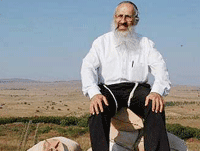Erev Yom Kippur – Forgiving One Another
by HaRav Shlomo Aviner, Head of Yeshivat Ateret Yerushalayim
On Yom Kippur we generally devote much energy to our relationship with God: to teshuva and to prayer. However, we all know that even on Yom Kippur, God does not forgive sins committed against others unless the wronged person has already pardoned us.
Naturally, there is no one who has not hurt his or her fellow in some way during the year, whether intentionally or unintentionally. Everyone has some trace of negative feeling toward someone else.
To remedy these feelings of antipathy, Arizal added a prayer to the nightly recital of the Kriyat Shema. We proclaim: “I forgive everyone who has angered me, provoked me, or sinned against me, whether physically, monetarily, emotionally, or in any other way, whether accidentally or purposefully, whether he was aware or unaware.” If all Jews would recite this, we could go to sleep at night with a clear conscience. The problem is that we don’t all do so. And even if we do, we don’t always mean it.
For this reason, there is an additional prayer, the Tefilla Zaka, recited on the eve of Yom Kippur, in which we resolve to forgive all those who have harmed us. Of course, not everyone says this prayer either. Therefore, the only solution is that every one of us, without exception, must forgive everyone else. All of Am Yisrael must enter into a contract with one another: that we will forgive if everyone else forgives. This enables God to forgive us, for one who forgives and overlooks the sins of others is treated likewise by God.
Of course, to effect true forgiveness, we must absolve others wholeheartedly. There are three lines of thought which may help us to achieve this goal:
We must realize that we ourselves also sin, and are very often guilty of the same type of wrongdoing for which we blame others. We tend to project our shortcomings onto others and to see our own faults reflected in them. To counteract this, we must bear in mind that other people are as humanly fallible as we are.
We must recognize that the other person is fundamentally a decent human being. He or she may have faults, but these should not be exaggerated. There are certain people who may arouse in us feelings of hostility, but we must keep things in proportion and train ourselves to look at others positively, “with a good eye.”
We must accept upon ourselves, for the future, not to hate anyone – neither at work, in the community, nor in the family. This does not mean that we should never rebuke anyone, but it must be done gently and with love, so that it will ultimately achieve its goal.
HaRav Tzvi Yehuda Kook and Yom Kippur
A student approached HaRav Tzvi Yehuda on Erev Yom Kippur and asked forgiveness, inquiring if he had injured the Rosh Yeshiva in any way?” When Rabbenu said that he did not recall any particular offense, the student said that it was nonetheless customary to ask for forgiveness. HaRav Tzvi Yehuda responded, “If you did something, why have you waited until now? And if you did not, has asking for forgiveness turned into some kind of mechanical gesture like this?”
On Yom Kippur, HaRav Tzvi Yehuda said that one day of the year is exclusively for the Holy One Blessed Be He: Yom Kippur, since Satan and the evil inclination have no power to negatively influence people on this day as our Sages have taught. He would recite the Vidui of Erev Yom Kippur slowly, and he would strike his heart forcefully, the sound of which could be heard from a distance. (I wondered for which sins was HaRav Tzvi Yehuda striking himself so hard? Perhaps the sins of the community, or over sins which Hashem is so exacting with the righteous “within a hair’s breadth”). HaRav Tzvi Yehuda said that it is not appropriate to sing “Ashamnu, Bagadnu…,” rather it should be said with sadness and pain.
A student once wore a vest that was partially red on Yom Kippur. HaRav Tzvi Yehuda pointed out to him that this was not appropriate for such a holy day of spiritual cleansing. After all, we have the custom to wear white, and certainly not red, as the verse says, “Though your sins are like scarlet, they shall be as white as snow; though they are red like crimson, they shall become like wool,” (Yeshayahu, 1:18).






